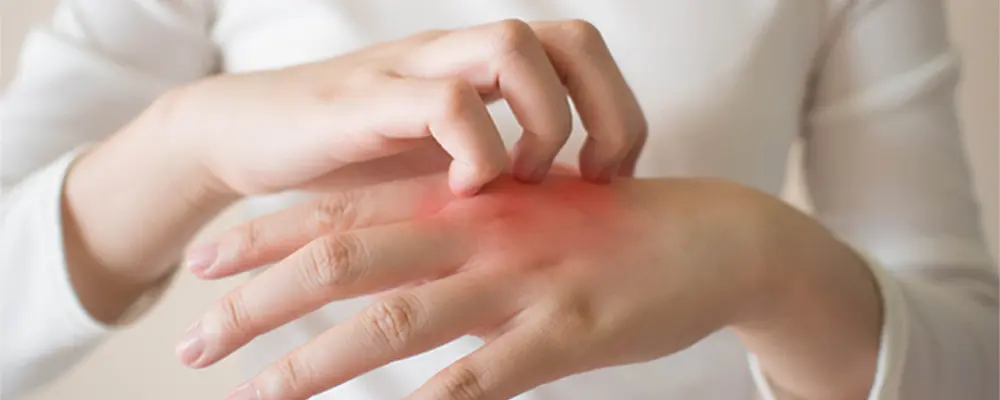There are several reasons why one may experience itchy fingers, including relatively harmless causes like dry hands. However, itchy fingers can also be a sign of a skin condition such as psoriasis, various types of eczema, or a nerve-related issue like diabetic peripheral neuropathy.
Itchy fingers can be distressing. In some cases, the itching may resolve on its own without much attention. However, persistent itchiness or itching that leads to inflamed or broken skin should be monitored and requires consultation with a healthcare professional.
This article explores four specific conditions that could cause itchy fingers, discusses the possible triggers, and provides treatment suggestions on how to manage it effectively.
Causes of Itchy Fingers & Possible Treatment Options
Diabetic Peripheral Neuropathy
Diabetic peripheral neuropathy is a condition that stems from diabetes, where the body struggles to regulate blood sugar due to either insufficient insulin production or reduced insulin sensitivity. It causes itchy fingers as one of its primary symptoms.
However, elevated blood sugar levels over time can lead to damage to the protective myelin sheath surrounding nerve cells. As this myelin deteriorates, nerve cells can begin to malfunction, causing sensations such as burning, numbness, tingling, itching, or pins-and-needles. These abnormal nerve sensations, collectively known as peripheral neuropathy, can become the reason behind itchy fingers sometimes.
Possible Triggers
- Fluctuations in blood sugar levels
- High blood pressure
- High cholesterol
- Smoking
- Excessive alcohol consumption
- Genetic predisposition
Treatment
Diabetic peripheral neuropathy can be one reason for itchy fingers; however, it can be treated with:
- A healthy diet with less carbohydrates and fats consumption
- Regular exercise
- Weight loss, if necessary
- Insulin and other diabetes medications to control blood sugar levels
- Oral medications such as Cymbalta (duloxetine), Neurontin (gabapentin), and Elavil (amitriptyline) to alleviate neuropathic symptoms
Dyshidrotic Eczema
Another reason for itchy fingers is dyshidrotic eczema—a type of eczema that develops on the fingers and palms. This condition causes small, fluid-filled blisters that are extremely itchy. The affected skin may also become red, flaky, cracked, and painful.
The exact cause of dyshidrotic eczema is unknown. However, the following triggers can increase the risk of developing dyshidrotic eczema:
Possible Triggers
- Exposure to irritants like nickel and chrome
- Extreme stress or anxiety
- Excessive sweating
- Ultraviolet radiation exposure
- Smoking
Treatment
Dyshidrotic eczema can be treated with:
- Corticosteroids to quickly reduce inflammation.
- Over-the-counter antihistamines can help alleviate itching.
- Moisturizers can soothe and repair dry, damaged skin.
- A cold compress can also provide relief.
Learn More About Vulvar Eczema
Psoriasis
The third reason could be psoriasis, an autoimmune disease in which the body’s immune system attacks skin cells, causing inflammation. This leads to an increased turnover of skin cells, meaning they are formed and shed more quickly than normal. As a result, skin cells accumulate on the surface, forming dry, itchy, scaly plaques on skin.
Possible Triggers
- Emotional stress
- Excess sun exposure
- Strep throat
- Skin infections
- Extremely cold, dry weather
- Extremely hot, humid conditions
Treatment
Psoriasis can be managed with a variety of medications and treatments, including:
- Emollient moisturizers
- Topical and oral corticosteroids
- Topical or oral retinoids, like tretinoin and isotretinoin
- Light therapy
Learn More About Psoriasis Vulgaris
Atopic Dermatitis
Last but not the least, atopic dermatitis, also known as eczema, is a chronic skin condition characterized by dry, itchy, and inflamed skin.
Atopic dermatitis causes patches of dry, red skin that can make fingers extremely itchy. Scratching the affected areas can lead to further inflammation, cracked skin, and even infection.
Possible Triggers
- Harsh soaps and detergents
- Wool and synthetic fabrics
- Stress
- Sweating
- Changes in temperature and humidity
- Dust mites and pet dander
- Certain foods, such as eggs, dairy, and nuts
- Pollen
Treatment
Managing atopic dermatitis involves a combination of self-care measures and medications:
- Use moisturizers often.
- Apply creams for flare-ups.
- Use prescribed ointments for immune response.
- Take antihistamine for itching.
- Try UV light treatment.
- Severe cases may need stronger medicines.
- Wear cotton gloves at night to avoid scratching.
- Use a cool compress for relief.
All four of these conditions can potentially cause itchy fingers. However, topical creams or ointments can provide temporary relief. It is also important to avoid harsh skincare products that might cause irritation. Besides for severe cases, consulting a healthcare professional is advisable.
When to See a Healthcare Professional?
It is advisable to see a healthcare professional when:
- One experiences an intense itch on fingers or hands
- The itch persists for more than a week
- The irritation is accompanied by a rash, blisters, cracked skin, or skin plaques
Key Takeaways
Itchy fingers can be caused by various conditions, including diabetic peripheral neuropathy, dyshidrotic eczema, psoriasis, or atopic dermatitis. However, the treatment options may differ depending on the underlying cause. One can prevent it by using topical creams or ointments for temporary relief, avoiding harsh skincare products, thoroughly drying hands after washing, and wearing gloves in cold, dry weather.
Moreover, Revival Research Institute is conducting Dermatology Clinical Trials that may potentially help with skin conditions such as itchy fingers or dryness of the skin. Your participation could make a difference!




